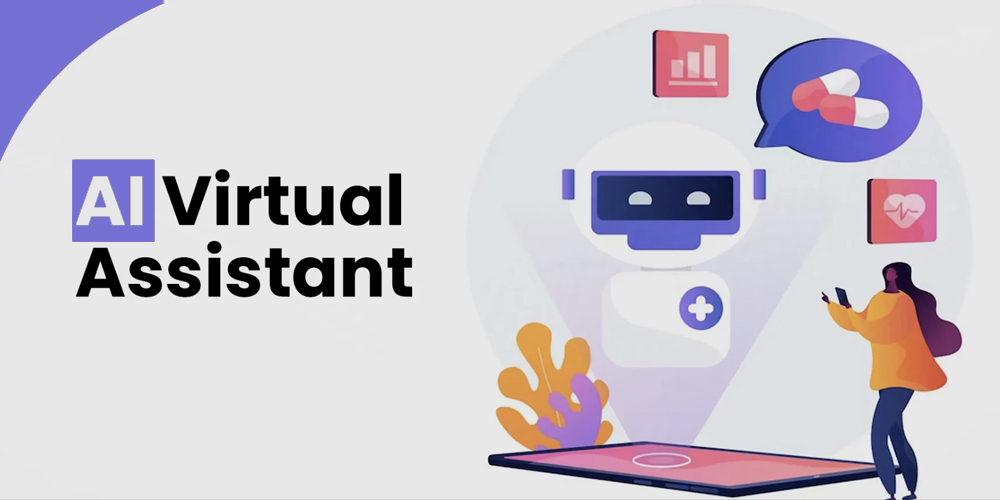An AI virtual assistant is a software agent that uses artificial intelligence to perform tasks or services for individuals or businesses. These tasks can range from simple administrative duties to complex problem-solving activities. AI virtual assistants leverage natural language processing (NLP), machine learning, and other AI technologies to understand and respond to user queries, automate workflows, and provide insights.
A complete guide on AI-Virtual Assistant
Capabilities and Functions of AI Virtual Assistants
1. Personal Assistance:
AI virtual assistants like Siri, Google Assistant, and Alexa provide personal assistance by managing calendars, setting reminders, making calls, sending messages, and offering weather updates. They can play music, provide directions, and answer general knowledge questions, making everyday life more convenient for users.
2. Customer Support:
Many businesses use AI virtual assistants to enhance customer support. These assistants handle customer inquiries via chatbots or voice interfaces, providing instant responses to common questions, processing orders, tracking shipments, and troubleshooting basic issues. They improve customer satisfaction by offering 24/7 support and reducing wait times.
3. Administrative Tasks:
AI virtual assistants automate various administrative tasks such as data entry, scheduling meetings, managing emails, and organizing documents. They can integrate with office tools like Microsoft Office 365, Google Workspace, and project management software to streamline workflows and boost productivity.
4. E-commerce Assistance:
In the e-commerce sector, AI virtual assistants help customers find products, recommend items based on browsing history or preferences, assist with checkout processes, and manage returns. They enhance the shopping experience by personalizing interactions and simplifying the purchasing journey.
5. Information Retrieval:
AI virtual assistants can quickly retrieve information from large datasets. They can provide insights from business analytics, generate reports, and offer data-driven recommendations. This capability is particularly valuable for decision-makers who need timely and accurate information to make informed choices.
6. Voice-Activated Control:
Smart home devices, such as lights, thermostats, and security systems, can be controlled through AI virtual assistants. Users can issue voice commands to adjust settings, monitor home security, and control various connected devices, creating a seamless and integrated smart home experience.Skills and Qualifications.
Key Technologies Behind AI Virtual Assistants
1. Natural Language Processing (NLP):
NLP allows AI virtual assistants to understand and process human language. This involves tasks such as speech recognition, language translation, sentiment analysis, and context understanding. NLP enables virtual assistants to interpret user commands and respond appropriately.
2. Machine Learning:
Machine learning algorithms enable AI virtual assistants to learn from interactions and improve over time. They can recognize patterns, predict user needs, and provide more accurate responses by continuously analyzing data and feedback.
3. Speech Recognition:
Speech recognition technology converts spoken language into text, allowing AI virtual assistants to process and understand voice commands. This technology is essential for hands-free interaction and accessibility.
4. Cloud Computing:
AI virtual assistants often rely on cloud computing to process large volumes of data and execute complex algorithms. The cloud provides the necessary computational power and storage, ensuring that assistants can deliver quick and reliable responses.
Benefits of AI Virtual Assistants
1. Efficiency and Productivity:
AI virtual assistants automate repetitive tasks, freeing up time for individuals and employees to focus on more strategic activities. This leads to increased efficiency and productivity in both personal and professional settings.
2. Availability:
Unlike human assistants, AI virtual assistants are available 24/7. They can handle inquiries and perform tasks at any time, providing constant support and service.
3. Cost Savings:
For businesses, AI virtual assistants can reduce operational costs by automating tasks that would otherwise require human intervention. They also minimize the need for extensive customer support staff, cutting down on labor expenses.
4. Personalization:
AI virtual assistants can personalize interactions based on user preferences and behaviors. This personalized approach enhances user experience and satisfaction, whether it’s in customer service, e-commerce, or daily personal use.
Future Prospects
The future of AI virtual assistants looks promising as technology continues to advance. Improvements in AI algorithms, greater integration with IoT devices, and enhanced understanding of human emotions and context will make virtual assistants even more capable and intuitive. They are expected to play an increasingly vital role in various aspects of life and business, driving efficiency, enhancing user experiences, and enabling smarter decision-making.
Conclusion
In summary, AI virtual assistants are versatile, intelligent agents that perform a wide array of tasks by leveraging advanced AI technologies. Their ability to automate tasks, provide instant support, and offer personalized interactions makes them invaluable tools in both personal and professional contexts. As technology evolves, AI virtual assistants will continue to transform how we interact with digital systems and manage our daily activities.


